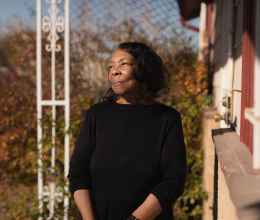The American Civil Liberties Union Foundation of Colorado (ACLU) filed suit today against the City of Colorado Springs, asserting that city officials violated the First Amendment when they denied a request from six peace and justice activists that they be permitted to hold signs on the public sidewalk across from the Broadmoor Hotel for one hour during the NATO conference that was held on October 8-9, 2003.
“The City prohibited our clients from standing in any spot where there was a chance that their message could reach its intended audience,” said Mari Newman, of Killmer & Lane, who is serving as an ACLU cooperating attorney on the case. “Instead, the City banished our clients to a location three full blocks from the entrance to the conference hotel, out of sight, where the NATO delegates would not see them, hear them, or even know they were there. In doing so, the City violated our clients’ constitutional rights to freedom of expression, to freedom of assembly, and to petition the government for redress of grievances.”
The entire Broadmoor Hotel was reserved for the NATO conference, which was attended by 1000 delegates from 26 countries. An additional 500 members of the media from around the world were based across the street at the International Center.
For four days beginning October 7, the City blocked streets, set up barricades, and imposed an unprecedented “security zone” that extended for two full city blocks on all sides of the perimeter of the Broadmoor Hotel property. To reach their homes, residents of the “security zone” were required to pass through checkpoints staffed by police and armed military guards. Persons who did not live in the cordoned-off area and were not associated with the conference were forbidden to enter. Media representatives with pre-approved press credentials were permitted to pass through the security checkpoints.
The ACLU lawsuit was filed on behalf of six members of Citizens for Peace in Space (CPIS), a Colorado Springs-based peace organization that has opposed the government’s military and nuclear weapons policies since the unveiling of the “Star Wars” program in the 1980s. A week before the NATO conference, the lawsuit says, the ACLU wrote to city officials on behalf of CPIS. The ACLU asked the City to accommodate a brief peaceful demonstration in which six CPIS members, each of them identified well in advance, would display signs for one hour at a specified time while standing on the public sidewalk outside the International Center, where they had engaged in similar activity without incident numerous times in the past. The CPIS members offered to submit to the identical security procedures as the hundreds of media representatives who were permitted to enter the “security zone.” The letter also pointed out that each of the CPIS members was already well known to the Colorado Springs police as being firmly committed to nonviolence.
The City refused to permit the CPIS members to enter the “security zone.” Instead, they were required to stand on the opposite side of a security checkpoint on Second Street, more than three blocks from the hotel entrance and more than two blocks from their requested location, on a narrow grassy strip (there was no sidewalk) between the road and the edge of a ditch. At this location, the lawsuit asserts, the CPIS members could not be seen either by delegates at the Broadmoor or the media representatives at the International House.
“The City could easily have accommodated this peaceful demonstration without compromising the security of the NATO convention,” explained Ed Ramey, of Isaacson, Rosenbaum, Woods & Levy, who is also working on the case as an ACLU cooperating attorney. “There is no legitimate justification for banishing these peaceful and principled critics of government policy to a spot where they cannot be seen. A critical viewpoint is not a security threat.”
“In this case, Colorado Springs officials acknowledged that there were no terrorist threats nor any plans for large-scale demonstrations,” said Mark Silverstein, ACLU Legal Director. “There is a legitimate need to assure the security of the NATO conference, but that cannot justify suppressing all criticism of the government throughout such a huge geographic area. Unfortunately, law enforcement has become more and more willing to use ‘security’ as a pretext to insulate public officials from critical viewpoints. For that reason, we are asking the Court to rule that Colorado Springs went too far in this case.”
In addition to Citizens for Peace in Space, the ACLU’s clients include William Sulzman, Mary Lynn Sheetz, Sister Barbara Huber, Gerard Jacobitz, Donna Johnson, and April Pergl. The suit was filed in federal district court in Denver.
